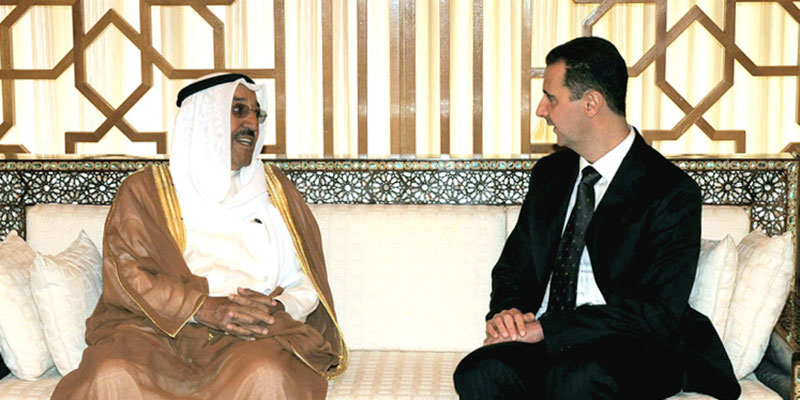Introduction By Dr. John Duke Anthony
In pursuit of its educational mission, the National Council works to serve as an information clearinghouse. It is in this spirit that it provides the following essay. It does so as a public service. The author, Giorgio Cafiero, is the Founder and CEO of Gulf State Analytics. Mr. Cafiero is a keen observer and analyst of matters pertaining to the Arab region, the Middle East, and the Islamic world.
This particular essay has to do with two countries with which the National Council has long been associated, namely Kuwait and Syria. From the onset of the 1990-1991 Kuwait Crisis, when its vastly larger and more heavily armed northern neighbor smashed to smithereens Kuwait’s national sovereignty, political independence, and territorial integrity, no U.S. non-governmental organization was more closely associated with America’s nationwide Free Kuwait Campaign than the Council.
The National Council’s leadership was on the first civilian aircraft to land in Kuwait upon its liberation. In addition, each month following the restoration of its security, the Council organized and led delegations of American leaders to Kuwait to see for themselves the immense damage inflicted upon the country’s infrastructure, economy, and people.
Syria, an eastern Mediterranean country, is vastly different. It is the home of cultures and civilizations that birthed the internationally more renowned Greco-Roman civilizations. Its Christian, Jewish, and Muslim roots are, arguably, deeper, vaster, and more diverse than any other country. Its links to Lebanon, Palestine, Iraq, and Jordan, and the water and agriculturally rich Golan Province that Israel has illegally occupied since 1967, have long rendered it inextricably intertwined with the region’s geopolitics.
To no other Arab country has the National Council organized and escorted more delegations of American Congressional, academic, and student leaders – approximately 400 all totaled – than Syria. Each has returned enamored with the extraordinary richness of the country’s culture, its contributions to world civilizations, and the enormous importance which more than a million Americans of Syrian ancestry attach to their ancestral homeland.
As should be clear from anyone who reads the mainstream media, few countries are at once as important to the United States, the region in which they are situated, and the world beyond, or as little understood, as Kuwait and Syria. As is clear from what Mr. Cafiero has to say about Kuwait’s policies and positions regarding Syria, he does not shy away from addressing some of the more complex and controversial issues of the day as they pertain to both countries.
John Duke Anthony, PhD
Founding President & CEO
National Council on U.S.-Arab Relations

KUWAIT’S MULTILATERAL APPROACH TO SYRIA
By Giorgio Cafiero
Almost 12 years after the Arab Spring erupted in Syria, sensitive questions surrounding the (il)legitimacy of President Bashar al-Assad and his regime divide Gulf Cooperation Council (GCC) members. The United Arab Emirates (UAE), Bahrain, and Oman favor bringing Syria back into the Arab League, and shoring up regional and international support for Damascus. However, as the GCC states most supportive of regime change at earlier stages of the Syrian crisis, Qatar and Saudi Arabia remain opposed to any moves aimed at rehabilitating Assad.
It is worth asking where Kuwait stands on this issue. Like most GCC states, Kuwait’s relationship with Syria quickly deteriorated after Syria’s Arab Spring protests picked up and the Assad regime resorted to lethal violence to crush the uprising. In December 2012, Kuwait closed its embassy in Damascus. During the previous year, Kuwait was the sole GCC state which refused to criminalize terrorist finance, resulting in the Gulf country becoming a hub for Kuwaitis and non-Kuwaitis to send donations to armed groups fighting Assad’s government.
Nonetheless, by 2014 there was a restoration of diplomatic ties at the chargés d’affaires level and Kuwait opened consular services for the 140,000 Syrians living in the Gulf country. In 2019, bilateral relations partially thawed. Still, there has yet to be a full rapprochement between the two Arab governments.
It is important to take stock of the history of Kuwaiti-Syrian relations, which were particularly warm in the 1990-2011 period. Of all GCC states, Kuwait was perhaps closest to Syria throughout the two decades preceding the Arab Spring.

